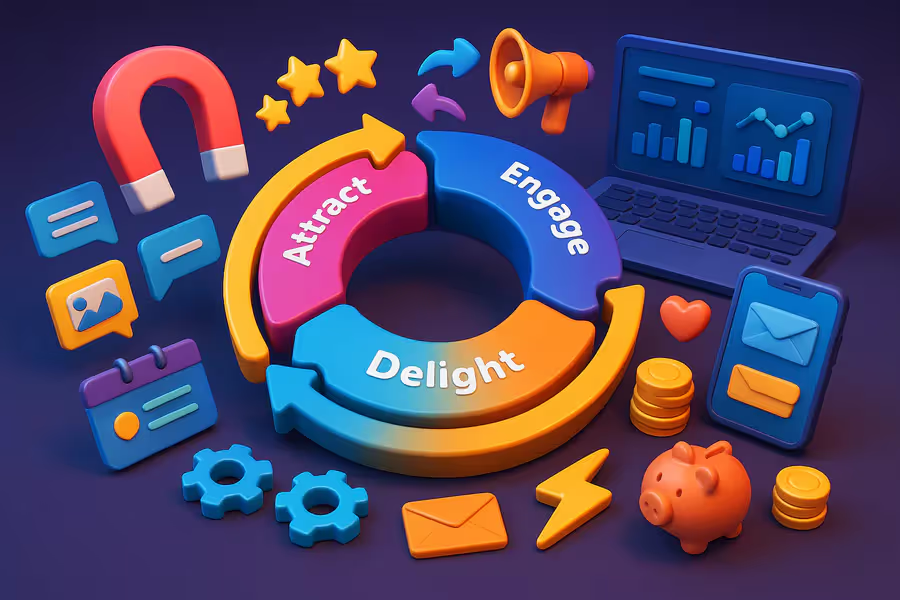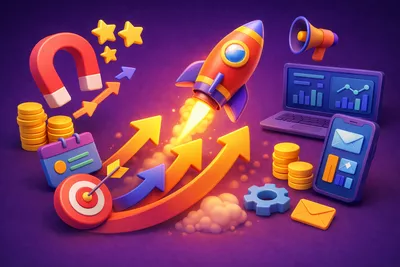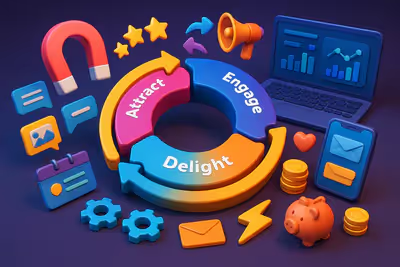What is the Flywheel?
The Flywheel works just like any other wheel.
Imagine the wheels of a car or a train. As they rotate, they gain pace, gain momentum, and start to move forward, faster and faster.
This idea of impetus and progress can (and should) be applied to businesses. Who doesn't want their business to move like the wheels of a car, gain speed and travel great distances?
The Flywheel is incredibly efficient at storing and releasing energy. It comes in handy when it is applied to your business that uses customers to grow its business.
The Flywheel: Funnel Revolution
Funnels are the mechanisms that turn prospects into customers.
Unlike the funnel that puts customers in the background in a marketing and sales strategy, the Flywheel model places them at the heart of all company activities, which keeps customers happy, encourages them to recommend us, and helps the business make sales.
The Flywheel model is worth abandoning your old sales funnel and how to use it to create a great customer experience while growing your business and generating more revenue.
Let's see what the differences are between Flywheel and Funnel.
Flywheel vs Funnel, what is the difference?
A Flywheel and a funnel are very different designs. We will discuss some of the main differences that are inherent in these two concepts:
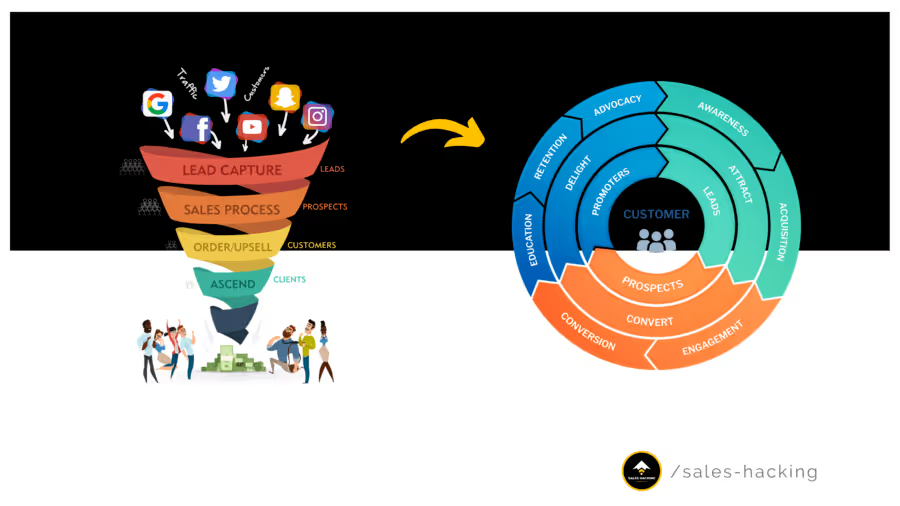
Customers are an Entry, not an Exit
With a “classic” funnel, customers are the result of a lot of energy expended:
- Lots of prospects are coming in,
- Only a small percentage are converted into customers
- And only a tiny fraction decide to recommend your product or service.
In the “traditional” sales funnel, those who have converted are not part of your brand's process of acquiring new customers.
In many businesses, success or customer support teams don't collaborate or even communicate with the marketing team.
Unfortunately the Customer returns are the most important benefits. They are the stored energy that fuels growth and should be the absolute concern of the marketing team - you could even say that they are their secret weapon.
It is thanks to customers that it is possible to continuously improve its products or services but also to win new customers that are easier to convert at a lower cost.
“End Point” VS “Ongoing”
With a funnel process, at the end of each exercise, teams have the impression that they have to start from scratch, resulting in a general decrease in motivation.
In other words, having succeeded in generating new opportunities during the previous fiscal year did not allow the current fiscal year to reach the objectives.
With the Flywheel, businesses have the resources to achieve continuous growth through inbound marketing efforts, the SEO, the commitment to social networks and their own customers. These assets are stored energy that keeps growth in motion.
Silo teams vs real teamwork
If you think about the funnels you've encountered in your business, you'll probably notice that there are too many of them. Indeed, there is often a sales funnel, a marketing funnel, and a dedicated customer service funnel. In addition to creating a process that creates more friction for your prospects/customers, it silos your business.
The Flywheel makes it possible to remove these silos and to bring all teams together on a single strategy.
When marketing, sales, and customer service work together to achieve the same goals, everyone benefits more from solidarity, of trust And of collaboration.
Instead of marketing against sales, or a difficult customer being the “customer service problem,” the entire team can combine their unique and varied expertise to offer a higher level of service and a more pleasant experience for each prospect or customer.
Implement a Flywheel
Now that you've understood what a Flywheel is, chances are you want to know how to implement it.
Prioritize the customer.
The biggest change Flywheel brings is that it adds customers to your growth model. When you put the customer at the center of your business, you align your business goals with its success. It's the recipe for sustainable long-term growth.
While most businesses like to say that their customers are their priority, it turned out that only 12% of customers believe a business when it says “put the customer first.” It's a shame that businesses say they put the customer first without doing anything to confirm this statement.
Build your strategy around your customers, not the other way around.
Most businesses have processes in place that help them work more effectively and grow, but that aren't necessarily tailored to customer needs. These two elements don't have to be contradictory, but customers should always put operational efficiency first.
Don't compromise your customer experience for the sole purpose of solving problems with your internal systems.
Remove frictions from the customer experience.

Efficiency, ease, comfort, or “seamless” process/transition - that's how our brains are programmed to search in every aspect of our lives...
And this desire is even more pronounced, when a customer seeks to find a product/service or a solution to meet their needss. After all, we (humans) have succeeded strongly to reduce our overall attention span.
Predisposed to these behaviors, it's obvious that customers don't like obstacles or friction of any form. It is therefore important to review their experience in order to find and combat all the frictions.
The way you win the hearts of your customers isn't just about creating great products or services and talking about them constantly on your website or your social networks. When brands can eliminate friction for their customers and improve their shopping experienceAnd, they create a real bond and a lasting relationship based on trust and reliability!
Build a 360-degree view of the customer.
In order to create a unique end-to-end experience for your customers, it's important to have a unified view of your customers.
Creating lasting relationships is crucial for any businesse. The use of a customer relationship management system (CRM) intelligent and robust allows different departments to record and share correct and meaningful data or information about a customer, regardless of the medium used.
This transparent data sharing demonstrates professionalism and ensures that all customer interactions leave little room for error. It also means that each department is aligned with internal and external goals.
The customer-oriented approach is essential to the success of a business. Customers thus have the impression that they are at the center of the experience since there are no silos at each stage of their journey.
To really put the customer first, you need to have a system that is flexible and that adapts to customer needs, not to your internal processes.
Eliminate the friction between marketing, sales, and customer service.

Friction slows your Flywheel and, ultimately, the growth of your business.
That's why it's important to constantly assess your customer journey, identify pain points, and resolve them for customers.
A common sticking point is the need to reach customer support. An effective way to eliminate this friction is to help customers help themselves.
Helping customers at every opportunity
When a customer has a simple question, their first step is not to call you, but to do a Google search. To help him, you need to have solid external resources that are indexed in the various search engines. Customers need to be able to find the answers they are looking for quickly.
Consolidate and inventory knowledge
The first step in creating autonomous processes starts within your organization.
Most businesses have a wealth of knowledge that could really help their customers, but it's locked up in people's brains, in Google Docs, or in post-it notes scattered around offices.
Compile and share this knowledge to easily create a base that will help customers to the fullest.
Make your knowledge public
Once you've collected and cataloged your knowledge, you need to find a place for it online so customers can easily access it.
It is possible to facilitate access to this information with the help of:
- Your blog,
- Specific pages,
- A community
- Or a simple FAQ
Take the time to list common questions from your customers during your various interactions.
By moving from reactive to proactive support by creating an accessible knowledge base, it's easier for your teams to get unified answers.
Nowadays, this knowledge is often scattered across the various departments of the company. By sharing your knowledge and resources, it's easier to achieve a frictionless customer experience.
Satisfy your customers
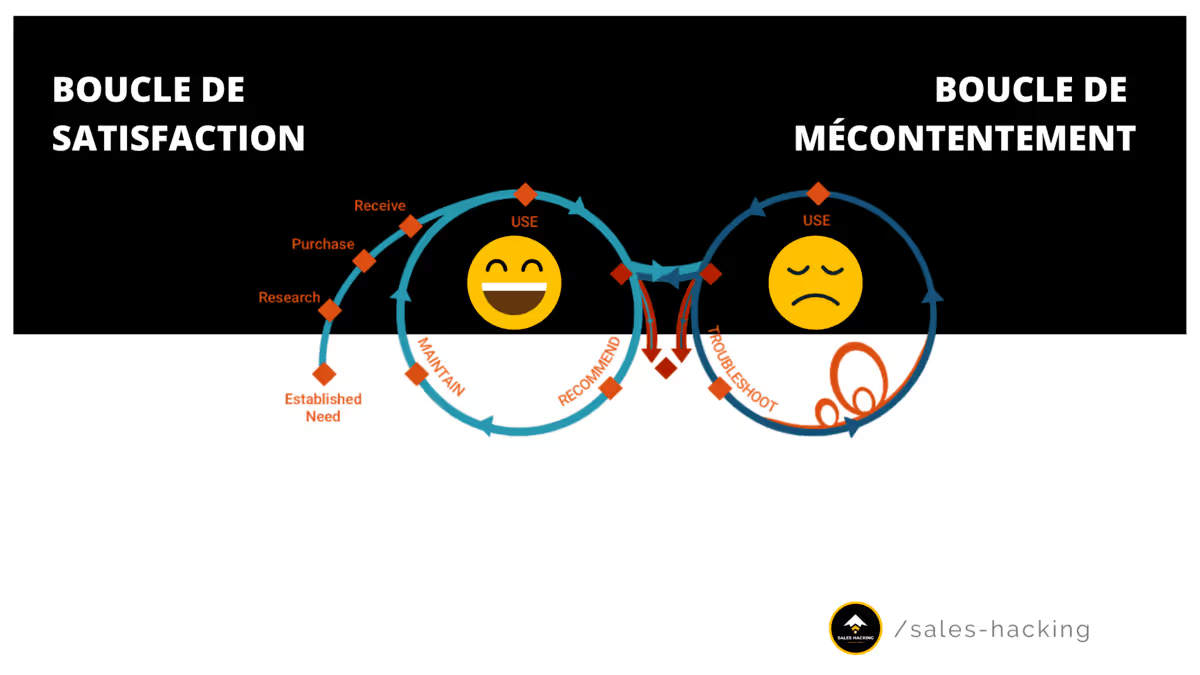
Satisfying customers is easier said than done. In a way, it is an omnipresent commercial currency that is no longer taken seriously. But studies show that customers have higher expectations than ever and are more likely to share their experiences online and in person. E
In other words, satisfying the customer is more important than ever and is essential to differentiate your brand.
It's often easier to keep the customer happy when you're a small business because you have time to personalize every interaction. But as your business grows, personalization becomes more and more difficult.
So how do you evolve your business and continue to satisfy your customers?
Centralize communications with customers.
When customers come to your business, you need to plan a simplified process upfront that ensures a seamless customer experience.
A help desk serves as the foundation to help teams stay organized and deliver solutions effectively.
Keep a detailed log of your customers.
CRMs are excellent tools because they allow you to follow the different stages of the customer life cycle as well as the various questions asked.
They provide insight into how users interact with your business, allowing you to satisfy your customers because you know them exactly.
Make sure your entire business can access customer information.
Being present for customers is a team sport, which is why each employee in your company must be able to provide an appropriate solution during each interaction. Les teams collaborate better with each other when they have the same common vision and the same information at their disposal.
Setting up a more organized and available system increases efficiency without sacrificing service quality.
Develop word-of-mouth marketing
Once you've removed the friction and provided a knowledge base, you've done a great job improving the customer experience.
Now, with happier customers, you have the opportunity to create word-of-mouth. The Word-of-mouth marketing is effective because buyers are less interested in what businesses say about themselves and more attentive to what other customers say.
Creating a successful customer experience.
“So that your Flywheel runs faster”, it is essential to satisfy the customer.
By providing customers with a great experience, they become advocates for your business. With the increasing importance of word-of-mouth marketing, you Above all, transform your best customers into your best salespeople.
Identify happy customers and those who are not.
Identify your happy customers and those who are not by collecting information about their experience with your business.
Take the time to thank customers who left positive reviews but also to respond to those who gave negative reviews.
Helping unhappy customers get answers.
Your business needs toHave a system that makes it possible to contact dissatisfied customers and to resolve their problems effectively.
This thoughtful approach can help you maintain customer trust in your business, especially when customers are at risk of losing customers.
Likewise, it is useful to launch communication programs that highlight the voices of your company's biggest influencers, those who remain your best salespeople.
For many businesses, it is interesting to standardize the automation of these promotional actions, as well as to improve reporting and information on customer feedback data.
Investing your IT expenses intelligently
In a model where businesses want to get the “best product” or the “best service,” it is important that they use these investments to make their teams more effective but also to make each customer experience more fluid.
Improve the skills of your teams
When businesses have grown, they have added men and placed them in specialized roles.
Within your sales representatives, roles have been created to manage current affairs:
- Pre-sales,
- Of operations,
- Various “hunters” or “ranchers”
- But also of Account Manager
The companies hired and trained employees, experts or specialists who could delve into a specific field.
The experts are very good at dealing with specific customer issues. But when you have multiple specialist roles, that means that your client is being transferred from one person to another and that leads to friction.

Benefits of using the Flywheel model
If you're a professional, you probably know the marketing and sales funnel by heart. Funnels are nothing but the mechanisms for converting prospects into customers. And that's it!
What happens next isn't often a topic that gets a lot of attention here. That's where the Flywheel model comes in!
One of the main benefits of the Flywheel model is that it allows you to focus on improving a customer's journey, even after they become a customer.
Care for them from their first steps as customers until they become followers of your product and/or service and advocates of your brand.

The image of the Flywheel model above illustrates how a customer is at the center of the strategy and each of the areas of interest represents how they are led to become the company's spokesperson.
The model also effectively identifies the causes of friction in marketing, sales, and service. You can see exactly which activities are propelling your Flywheel faster, giving it more and more momentum, or which activities are slowing you down and causing snags or jerks.
Finally, the model also details the impact of customer satisfaction on the success of your marketing strategy. In short, happy customers mean more customers.
Below are some tips and tricks for effectively using the Flywheel model to provide an exceptional customer experience.
Use your Flywheel as a Growth Tool
There are three factors that determine the speed of rotation of your Flywheel:
- The speed at which you rotate it
- The degree of friction
- How it is composed - its size and volume
Better teams = better strategies
Let's start with the speed at which you keep things spinning. Speed is increased by applying more force in areas where it can have the greatest impact.
- In a funnel modelr, all the force is applied to attract and acquire customers.
- In a model at Flywheel, you also apply this force to satisfy your customers and make them progress.
Because you're exerting all sorts of forces all around your Flywheel, make sure that none of your efforts are in conflict with the other. A lack of alignment between sales and efforts to keep your customers happy, for example, can create unhappy individuals and slow your inertia when they abandon you.
The classic misalignment between sales and marketing is another area where Flywheel can be slowed down. This alignment is crucial.
You can reduce friction by finding faults and improving them. Increasing conversion rates, satisfying customers, and solving problems that cause you to lose them means increasing the speed of your Flywheel. The other critical aspect to consider when thinking about friction is how your teams are organized. Silos, the fluidity of exchanges between different departments or the lack of common objectives are all factors that create friction.
If you can increase speed and reduce friction, you'll get happier customers. More happy customers mean a “heavier” wheel, which produces more energy when it rotates. In other words, your Flywheel produce more growth as the number of your customers increases. If you can add “density” to these customers, getting them to choose more of your products or recommend you more, you'll get even more dynamism and growth.
Customer satisfaction is no longer enough
Flywheels (flywheels) are devices that store energy. Businesses spend huge amounts of energy generating leads and converting them into customers. That energy is wasted if you let customers disappear after they buy.
By investing to satisfy hard-won customers, businesses can reap the benefits of having sets of brand spokespeople rather than just happy customers. It's these “fans” who are creating winning brands in the new hyper-connected world.
By going the extra mile to create ambassadors rather than happy customers, you maximize:
- Loyalty,
- The recommendations
- And references.
They bring you new prospects through their networks. The process repeats itself... and Your Flywheel is gaining irrepressible momentum.
La Flywheel is a model of long-term success in a hyper-connected world.
Conclusion
Change can be difficult when it comes to redesigning a tool that is so critical to a business. Funnels have long served their purpose. Maybe they're still doing it.
Although the Flywheel model changed the industry in 2018, it seems that the majority of businesses are still far from knowing this model and this new way of thinking.
Whether you prefer a more traditional setting or a new way of doing things, what matters is that you follow where your customers come from, what they are experiencing, and that you reduce any forces that stand in the way of your growth.

.svg)
